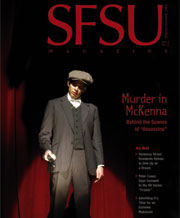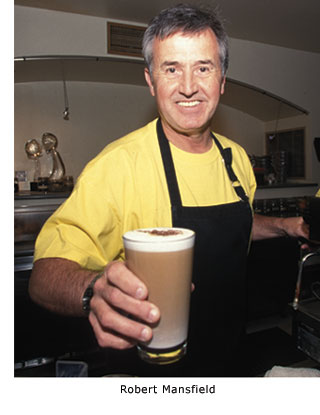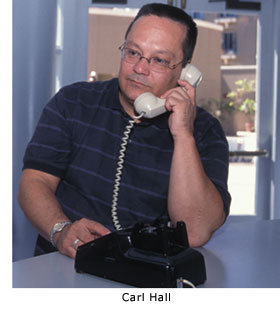 |
| |||
No Longer a Dream The Future is looking bright for new graduates from Delancey Street For the past three years, regulars at the Delancey Street Café have come to depend on Robert Mansfield to remember their espresso drinks of choice. He greets his customers by name. His speedy service always comes with a smile. "Robert's great," says San Francisco Examiner reporter P.J. Corkery on his way to the counter for his morning coffee. "He keeps all the journalists alive." If you stick around through the lunch rush, you'll see that Mansfield can juggle drink orders with ease and also step away from the counter at any time, confident that one of his shift managers will keep things running smoothly. Like a lot of older SFSU students, Mansfield, a 54-year-old urban studies major, postponed his college education. But it wasn't family responsibilities or financial obligations that got in the way. Some of his customers are familiar with his past. A woman sipping coffee in the corner remarks, "He's so nice. I can't believe he was in the Q for 10 years." Q as in San Quentin. Mansfield spent most of the decade between 1985 and 1995 doing time for fraud, embezzlement and various drug-related charges. "My rap sheet is 12 pages long," he says, "and that's single line entries." Mansfield is not proud of his past, but he's looking forward to his future. He's one of seven students at the Delancey Street Foundation, a nationally recognized residential self-help center, who earned their bachelor's degrees in urban studies from SFSU this spring. They are the first graduates of the San Francisco State University Urban Studies Program at Delancey Street. For more than 30 years, the Delancey Street Foundation, which owns the popular café and its neighboring restaurant on San Francisco's Embarcadero, has offered a last chance for the down and out after their tangles with drugs, petty larceny, armed robbery, prostitution or other crimes have left them with no other options. New residents are required to arrive -- and stay -- drug- and alcohol-free. And they're required to work. Hard. The self supporting organization owns six businesses that serve as training grounds for residents in need of marketable job skills and a new sense of responsibility before re-entering society. "At San Francisco State we believe that a college education is an opportunity that should be available to all who are ready to accept the challenge," says President Robert A. Corrigan, who extended the University's services to Delancey four years ago. "Through this collaboration with Delancey Street, we've found a way to bring this opportunity directly to a group of people who are working very hard to leave their mistakes in the past and rebuild their lives." Mansfield remembers his arrival at Delancey nine years ago. "I figured I would take a little nap before dinner," he says and laughs. Instead, he was sent directly to the dining room to scrub tables. He's stayed busy ever since. Now, in addition to managing the café, Mansfield oversees Delancey's credit and collections department. "I don't have a minute from one job to the next," he says. "Then at 1 and 2 a.m., I'm studying." For four years, Mansfield and his classmates have taken classes together at Delancey Street, about 12 units a semester, traveling on occasion to SFSU to use computer and lab resources and taking science-related field trips. Classes are scheduled around the residents' 12- to 15-hour workdays and taught on a volunteer basis by SFSU faculty, including Raquel Pinderhughes, director of both the University's urban studies program and its Delancey Street college program, and Lisa White, chair of geosciences; by Mimi Silbert, founder, president and CEO of the Delancey Street Foundation; and by education and civic leaders, including State Sen. John Burton (B.A., '54), who taught a class on urban politics. "Everyone involved put something extraordinary into this process," Silbert says, adding that she's grateful for President Corrigan's enthusiastic support, the commitment from SFSU faculty, who took on extra hours of work, and University staff, who attended to the program's administrative details.
From freshman year to graduation, the students learn and study with a supportive group of classmates, each held to the same academic standards as other SFSU students. "The bachelor's degree is an extraordinary accomplishment for this group," Pinderhughes says. "These students came in with a very low sense of self in terms of academic achievement. They are extremely dedicated and very professionally oriented." The director is proud that each one has maintained a G.P.A. in the 3.0 to 4.0 range. At 5 p.m. every Monday during the spring semester, Pinderhughes would end a full day of teaching at SFSU and head to Delancey Street. (Thanks to Mansfield, a cup of hot chocolate was always waiting for her.) Her students gathered around a table to report on and critique their professional field work in the community. With Pinderhughes' guidance, one student team spent the semester working on behalf of the Department of Aging to develop a plan to improve senior care in San Francisco's Bayview. Another conducted surveys for the Department of Human Services to explore how the city can better inform the homeless population about available services. Offering a single major in urban studies for the small number of students enrolled, the program is designed to produce "a greater diversity in the urban planning and policy professions," Pinderhughes says. The majority of the Delancey students plan on continuing their work in the community. Mansfield is interested in housing and planning. He says, "The job [I take] has to be constructive, has to better people's lives." A typical resident stays at Delancey for at least two years. When they are ready to leave, residents are allowed to stay at Delancey for three to six more months while they seek outside work and secure housing. Mansfield plans to leave the center early next year. Getting Anita Right Jackson's first attempt at college began at the University of Utah in Salt Lake City. While her three sisters went on to graduate, Jackson's drug use increased, and she fell behind and flunked out. "College, jobs, an apartment, some semblance of life -- I could never hold onto anything," she says. Jackson spent most of her twenties in and out of jail on charges of possession and fraud. She forged prescriptions and checks. Between jail sentences she drifted in and out of rehab programs. "I wasn't ready to stop," she says. "I hadn't hit bottom." Bottom came when she broke into her sister's house in search of money to buy crack. "I stole checks," she says, and pauses before adding, "I stole money out of my nephew's piggy bank." Eight years ago, her mother was on an airplane when an article in the in-flight magazine caught her eye. The story described the success of the Delancey Street program. Jackson's mother called her daughter as soon as her plane touched down. She told Jackson that if she didn't call Delancey, she feared she would soon wind up dead. Jackson heeded her mother's advice and bought a one-way ticket to San Francisco. She proved to the intake staff at Delancey that she was ready to change. "I needed to get Anita right," she says. Getting her life back on track was not easy. "The biggest challenge was caring about others, being responsible to someone other than myself," she says. When it comes to school-work, she and the other SFSU students at Delancey don't appear to have any problem looking out for each other. They're in this as a team. On a late night before mid-terms, several classmates were sitting under a lamppost in Delancey's courtyard, quizzing each other for a science test. "It's like going to school with brothers and sisters," Jackson says. "You know who's good at math, who's the egghead -- it feels comfortable. All of us started together and we survived." Jackson is also grateful for the support she's received from faculty. She says Pinderhughes' enthusiasm kept her working hard and believing in her abilities, adding, "All of the teachers have brought out the best in us." Professor Lisa White says the feeling was mutual. She didn't have to shush Delancey students or interrupt daydreaming in "Introduction to Oceanography," a course she taught with a team of SFSU science faculty, including a number from the University's Romberg Tiburon Center. She says the Delancey students are "active, motivated learners," hungry for knowledge and determined to get their degrees. Using His Brain Instead of His Back Harper grew up in San Diego in what he describes as a "party house" where family members used drugs. By age 12, he was shooting heroin. He was also running drugs across the Mexican border with an older brother who was later shot and killed by police during a robbery the two brothers pulled together. Harper's education came to an end when he was kicked out of school in eighth grade. From 1972 to 1992, the longest period he spent outside of jail was 90 days. In 1992, Harper was looking at an 18-year sentence when a judge offered him the chance to live and work at Delancey Street. His first goal at the center was completing his GED. Later, after he watched other residents enter the SFSU program at Delancey, he decided he was ready to tackle his college degree. Between serving as supervisor of Delancey's moving company and working in both the café and Silbert's office, Harper says, "I studied hard -- no matter how tired I was." He's enjoyed designing plans for a new community center for the city's elderly as part of Pinderhughes' class. After years of construction work and manual labor, he envisions a future working as a building inspector. "I want to use my brain instead of my back," he says. "It's exciting work -- the changes in codes, layouts, the ability to design an entire community. It's very fulfilling to be able to help people." Making His Family Proud -- Finally Hall, who is Native American, continued to take classes while working on the Makah Indian Reservation in Neah Bay, Washington. As the tribe's economic development planner, he helped create new business opportunities on the reservation. He got married and had children, but his drug abuse caught up with him. He flunked out of school. His marriage ended. He was caught stealing money from his workplace and was fired. While serving a 17-month sentence in the Nevada State Prison for assault and battery, he received a letter from his father telling him about a program that had changed a friend's life. On the day Hall was released seven years ago, he took a Greyhound bus straight to Delancey Street. Throughout his difficulties, he held fast to a private goal -- finishing his college education. Hall jumped at the chance to earn his degree at Delancey. During the past four years, his favorite class has been "Land-Use Planning" taught by Gary Binger, a former director of the Association of Bay Area Governments. Hall says Binger provided an insider's perspective into the world of state government: "How things really get done, what people say versus what people mean." Silbert, he says, "taught me that we have too many problems in the world for one person to solve. We have to do our individual parts." Hall manages Delancey's catering service and books events held in the center's screening room. Late at night, after he's put in a full day, Hall often returns to the quiet of the theater to work on his homework. When SFSU Magazine caught up with him he was putting the finishing touches on the graphics for his team's Power Point presentation to the City's Department of Health and Human Services. "It's an incredible opportunity to get a degree while living here. For me, it's an absolute blessing," he says. "I have big plans for my life." Those plans include a program designed "to make sure that no child goes into elementary school without the ability to make good decisions," he says. "I want to help children before they get here -- to Delancey Street." When asked where he'd like to put this program into place, he says, "My vision is nationwide. I want to form coalitions between school districts, day care programs, social service agencies, and parents." After finishing his undergraduate degree in summer school, Hall plans on leaving Delancey and pursuing his master's degree in marriage and family therapy at SFSU. Years ago, he felt his life was over but now, he says, "I've gotten my heart back." He's also regained his family. "I was a deadbeat dad. It's only been the last four years I've reconnected with my kids." While he was in prison, the three daughters he left behind on the reservation didn't have an easy life. Their mother died from a drug overdose, and it's taken a long time to rebuild a relationship with a father who has been absent most of their lives. Today, they're proud of what he's doing with the second half of his life, and, like Hall, they're also enrolled in college. During high school, Hall's twins, 20, had planned on college careers but his oldest, 24, wasn't inspired to go to college until her father took on the same challenge. Hall says his father is another proud family member: "My parents talk about Delancey Street as the one time I followed their advice." -- Adrianne Bee Delancey residents Robert Bernardo, Kimberly Darosa, John Pavao, Desi Rutherford, and Todd Terwey also graduated in the spring. Carl Hall and Diana Saunders are slated to graduate later this year followed by Freddie Baca and Greg Harper next spring. | ||||











